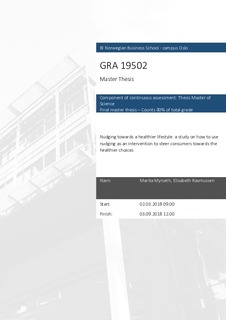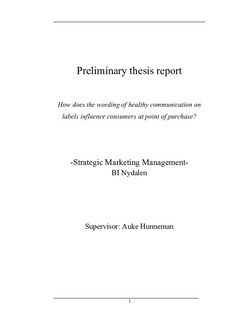| dc.description.abstract | Obesity has become a major issue worldwide and has a strong impact at various
economic and social levels. This calls for the need to find efficient ways to tackle
this growing problem. Recently, there has been a increasing interest in the use of
“nudges” as a policy tool and their potential to solve some of society’s biggest
problems, such as obesity. By using nudges, it is possible to steer consumers in a
certain direction by changing the choice architecture or environment around. This
allows for encouraging healthier choices without limiting individuals’ freedom of
choice. While nudges have promising applications, research literature has not given
them sufficient attention.
Our aim for the master thesis is to explore how health nudge interventions should
be designed in order to change customer buying behavior towards healthier options
while grocery shopping. In order to develop an effective nudge, we explore which
system of cognitive processing should be targeted, and how a nudge should be
framed at the front-of-pack label on fast moving consumer goods. Lastly, a
framework by Felsen (2013) has been adopted to test whether the framing of a
nudge should be through punishment or reward for making the healthier food
choice. The research is based on a thoroughly designed online questionnaire with
an integrated choice experiment, where our hypotheses were tested in two different
product categories; soda and bar. While the findings are inconclusive, they indicate
that our health logo is significantly effective in changing respondents’ behaviors
towards the healthier option in both product categories. The effect was strongest for
bars, which suggests that the product category has a crucial role in determining the
effectiveness of the nudge intervention.
Implications from this study include that the health logo has a positive effect in
changing respondents’ buying behavior and that it should be framed as a reward for
choosing the healthy option. Moreover, a “one solution for everyone” approach will
most likely be less effective, and should be adjusted when implementing different
nudge interventions. Behavioral research has shown that the way the environment
is constructed can shape a person's choices within it. Thus, it is hoped that by using
insights from such research, people can be nudged towards making decisions which
are better for their health. | nb_NO |

